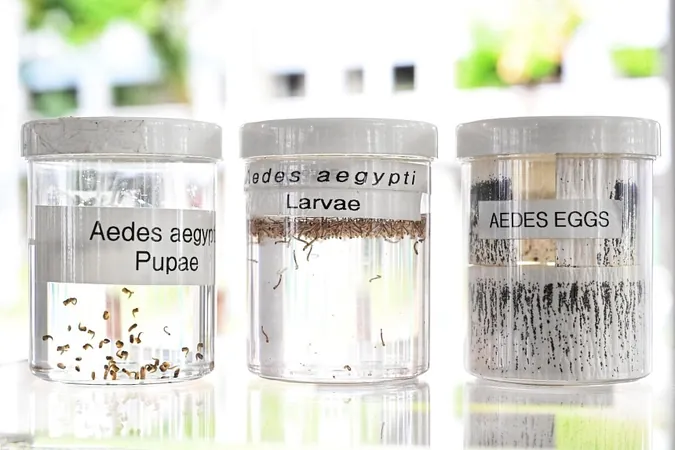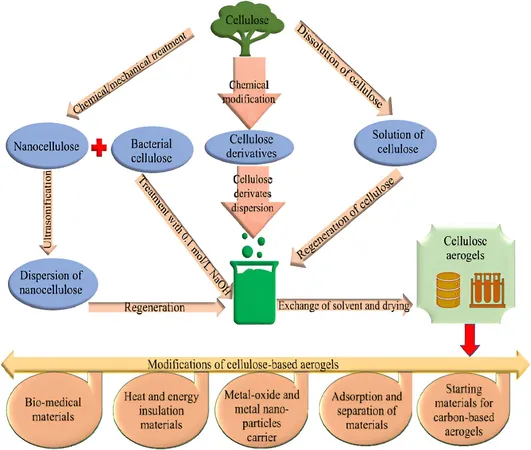
Major Expansion of Project Wolbachia Aims to Slash Dengue Risk in Singapore
2024-10-03
Author: Ming
Major Expansion of Project Wolbachia Aims to Slash Dengue Risk in Singapore
In a bold new initiative to combat dengue fever, Singapore is set to expand Project Wolbachia, a groundbreaking effort that uses lab-grown male mosquitoes to dramatically reduce the Aedes mosquito population. The project, which first launched in dengue-prone areas back in 2016, will expand its reach to five new residential neighborhoods.
The breakthrough project will now encompass a staggering 580,000 households, a significant increase from the previous coverage of 480,000. Beginning October 21, the expansion will focus on enhancing efforts in Hougang, along with introducing initiatives in Serangoon Central, Serangoon North, Jurong East, and Jurong West over the coming months. The announcement was made on October 3 by Minister for Sustainability and the Environment, Grace Fu, during a live mosquito release event in Hougang.
The National Environment Agency (NEA) strategically selected these new locations based on historical data indicating high dengue risk and the presence of Aedes mosquitoes. Under Project Wolbachia, male mosquitoes infused with the Wolbachia bacteria are released into high-risk areas. When these males mate with female Aedes, the resulting eggs fail to hatch, leading to a sustained decrease in the mosquito population over time.
Research indicates that communities participating in the Wolbachia initiative have experienced a remarkable 75% reduction in dengue infections. The NEA reported a staggering 80% to 90% decline in the Aedes aegypti mosquito population within the study zones, effectively mitigating the area's risk of severe dengue outbreaks. There’s even more good news: the same technology offers hope in preventing the spread of other mosquito-borne diseases, including Zika and chikungunya.
Public sentiment towards Project Wolbachia has generally shifted from skepticism to support. Many residents who initially feared an influx of mosquitoes have noted that the new mosquitoes do not bite, thanks in part to NEA's comprehensive education campaigns about the project.
Following the expansion, a total of 23 areas will be involved in Project Wolbachia. Existing sites—including Commonwealth, Yishun, and Marine Parade—will continue to see regular releases of the lab-grown mosquitoes, ensuring continued low levels of the Aedes aegypti population.
As of late September 2023, the NEA reported over 12,000 dengue cases for the year, reflecting a more than 20% rise compared to the total cases of 9,949 documented throughout 2023. Alarmingly, there were also 13 reported deaths linked to dengue infections from January to June 2024. However, despite the recent uptick in cases, Minister Fu reassured the public that the overall trend for the year is expected to be manageable, noting a pleasing drop in the monthly averages of dengue cases—from approximately 3,000 in 2022 to just 1,300 this year.
Stay tuned as Singapore continues to wage its war against dengue with innovative approaches and community-driven initiatives!





 Brasil (PT)
Brasil (PT)
 Canada (EN)
Canada (EN)
 Chile (ES)
Chile (ES)
 España (ES)
España (ES)
 France (FR)
France (FR)
 Hong Kong (EN)
Hong Kong (EN)
 Italia (IT)
Italia (IT)
 日本 (JA)
日本 (JA)
 Magyarország (HU)
Magyarország (HU)
 Norge (NO)
Norge (NO)
 Polska (PL)
Polska (PL)
 Schweiz (DE)
Schweiz (DE)
 Singapore (EN)
Singapore (EN)
 Sverige (SV)
Sverige (SV)
 Suomi (FI)
Suomi (FI)
 Türkiye (TR)
Türkiye (TR)